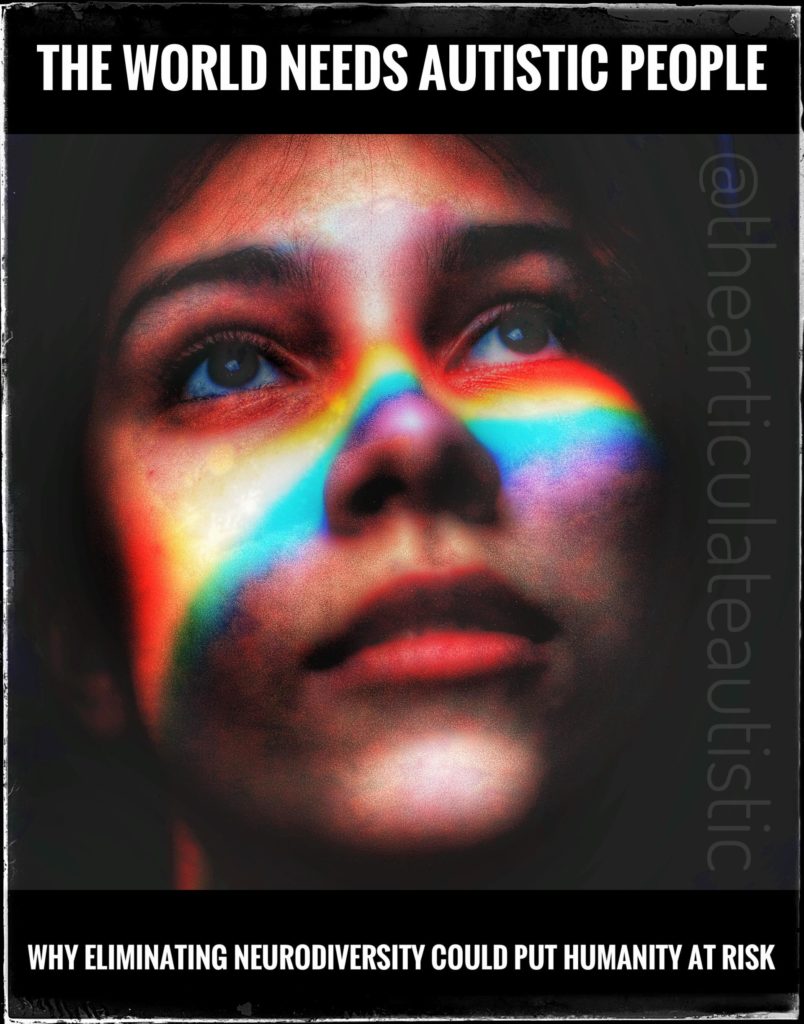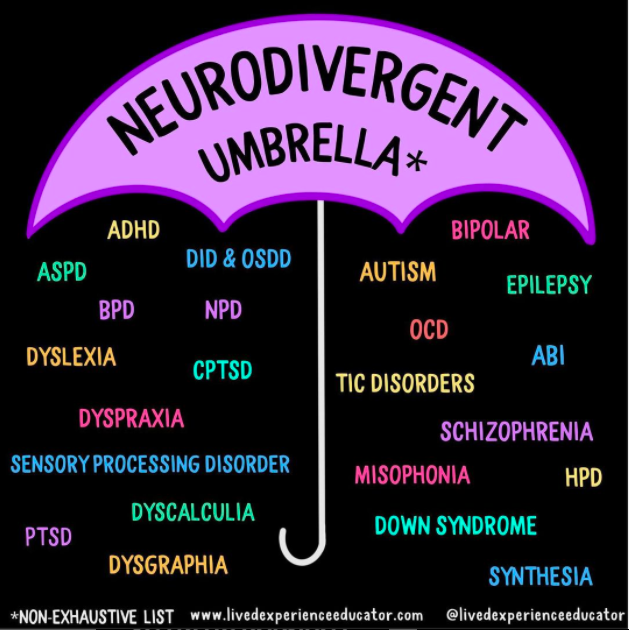The World Needs Autistic People – Why Eliminating Neurodiversity Could Put Humanity at Risk

Earlier this year, something the autistic community feared would happen did; science discovered a way to detect an autistic brain in the womb—which means the next step might be to try to “correct” this neurological difference in utero, potentially eliminating a natural neurological variation that’s essential to human survival.
If science decided autistic people should no longer exist, that would be eugenics, and it would not only be morally reprehensible, it may lead humanity down an even darker, more precarious path than it’s currently on.
People who fear neurological differences often don’t see the bigger picture–that neurodivergence has been around since time immemorial, and neurodivergent people (autistic, ADHD, dyslexia, dyscalculia, dyspraxia, OCD, etc.) have made progressive contributions to art, science, math, physics, philosophy, ecology, and so much more.
Neurodivergence isn’t a disease or a condition to be eradicated, it’s a variation in brain wiring designed by nature for the growth, adaptation, and ultimate survival of the human race.
In this article, I’ll focus specifically on the benefits of the autistic brain:
1. Social Hierarchy Blindness and Pattern Recognition Promotes Honesty
Many autistic people are honest to a fault, very blunt, and we see and treat everyone as equals. This means that, with us, the CEO of a company is going to get the same treatment, tone of voice, facial expressions, body language, and conversation as the janitor.
Unless we are taught by well-meaning neurotypical people that we should act differently around one human being versus another because of man-made notions of seniority, we won’t. Not because we don’t respect individual people, but because we see all human beings as equal. The concept of social hierarchy is quite literally, non-existent to many of us until it’s pointed out and explained by a neurotypical person.
Imagine this scenario:
You’re neurotypical, and there is a man in a significant position of power within your company. He makes you uncomfortable, and every time he walks into the room, the little hairs on the back of your neck stand on end. You know in your gut that something is off, but your supervisor, co-workers, and clients are always singing his praises. So, you (reluctantly) do, too.

And this reaction to follow along with the majority often isn’t even a conscious decision on your part. As a neurotypical person, your brain is hard-wired for social survival, and by being polite and agreeable on the surface (“going along to get along”)–even if a strong gut feeling is telling you something is wrong on the inside.
Now, imagine an autistic person being hired at the same company. She’s young and doesn’t yet understand the concept of social hierarchy because it’s never been explicitly explained to her. Completely oblivious to the unspoken social cues of the office workers around her, she openly asks questions about the man—trying to find validation or an explanation from her co-workers and alleviate her mounting discomfort.
Unfortunately, the autistic employee finds neither validation nor explanation but wide-eyed stares of shock at her candor. And everybody, even you (the neurotypical person), seems to be defending the guy when the autistic employee can clearly feel how uncomfortable you are.
This is baffling behavior to an autistic person!
So, the autistic employee starts digging a little deeper on her own, her brain desperately needing to balance the equation and make sense of the patterns she’s observing before being able to fully commit herself to doing the work she’s been hired for.
Why does the guy smile like that even though his energy is filled with rage and contempt? Why do his female employees leave his office looking as jumpy as a fawn crossing a busy highway? Also, how is this guy able to buy a yacht, a summer home, and a private jet when even his substantial salary could never cover it? Also, why isn’t anyone speaking up about the thousands of company dollars that are “lost” every month?
These anomalies and inconsistencies are puzzles to be solved for the autistic mind—not ignored and filed away in an attempt to maintain the status quo. It’s just not in our nature!
Over time, the autistic employee is likely to discover the truth about the man everyone in the office is uncomfortable around—he’s embezzling corporate funds and sexually harassing his co-workers, threatening them with job loss or the destruction of their reputation if they dare speak up.
In this case, the autistic employee would likely become a target and be fired or worse if he found out what she’d uncovered.
But imagine if we lived in a world where more people were open to speaking up when they see the emperor is wearing no clothes (the person is lying or irrational and everyone is just placating them due to their perceived station in life or a direct or indirect threat to their own health or social standing). Think about how much more fair, safe, and equitable our society would be!
That’s just one of the things the autistic brain brings to the table!
(That isn’t to say every single autistic person wants to be the physical embodiment of John Lennon’s “Imagine”, but there are many of us out there for whom justice, fairness, and equality are very high on our value scale.)
2. Sensory Sensitivities Highlight Overall Environmental Toxicity
One of the hallmark traits of being autistic is what is deemed as “extreme sensitivity” to the environment. Certain sounds, lights, and smells can be intolerable to us. Many of us clamp our hands over our ears at certain noises, tightly squeeze our eyes shut when exposed to certain lights, and gasp and cough violently when someone uses perfume or air freshener anywhere near us.
But, consider this, is it “abnormal” and “extreme” because there’s really nothing overwhelming about these sounds, lights, and smells, or is it simply that the neurotypical brain can automatically filter out an offending stimulus while the autistic brain cannot?
And, because a person’s brain is better equipped to filter out these things, does this mean their negative effects are any less of a danger to humanity, animals, and Earth itself?
No. In fact, quite the opposite.
A brain that’s better equipped to filter out the existence of toxicity (not the toxic elements themselves) may actually be a serious hindrance to change and growth in humanity, not a help.
Let’s take a look at some of these toxic elements:
- Overwork
In many cultures, working long hours without proper sleep, time off, and exercise is seen as something to strive for, something to be proud of. You’re considered a more valued member of society if you climb the corporate ladder, get a title after your name, drive a fancy car, and live in a luxury apartment–regardless of the cost to your health, relationships, or personal ethics.
Autistic people, especially before we are identified as such, often attempt to pursue these same goals while masking and trying to fit in–only to crash and burn and have no idea why.
Our neurology is not set up to navigate the world in a neurotypical way, but because so many of us simply aren’t aware of this, we end up in something known as autistic burnout for years, even decades!

Overwork, unless it’s due to hyperfocus on a task we enjoy and get energy from, can be quite dangerous to us autistic folks, mentally and physically. The heart attack you, a neurotypical person, have at 61 from working as many hours a week for decades could be the complete mental breakdown I, an autistic person, have at 34–and then end up on disability for (true story).
Autistic people just can’t keep up with the expectations laid out by the small percentage of people in power in neurotypical society–but that’s not a bad thing. It’s not the deficit a society obsessed with work makes it out to be.
Nobody, regardless of neurotype, should be working themselves into the ground as they do. It’s not healthy, and some studies prove it.
In fact, according to the World Health Organization, working more than 55 hours per week can be attributed to the development of coronary artery disease and stroke.
Strangely, the fact that autistic people tend to burn out and get sick faster, we’re leading by (albeit reluctant) example of what NOT to do if you want to be a happier, healthier, more well-rounded human being–and I think that’s a very valuable lesson for everyone to learn.
- Noise Pollution
Now let’s look at noise pollution. It doesn’t only affect autistic people, it’s just that autistic people react to it more strongly and immediately. According to the Australian Academy of Science, the health effects of noise pollution on all humans include, “heightened stress response, cognitive impairment, and cardiovascular disease”.
- Light Pollution
What about light pollution? Again, light pollution doesn’t just affect autistic people, it’s just that autistic people often react to it strongly and immediately. According to a study published in Environmental Health Perspectives, artificial light has a very strong correlation with the development of breast cancer!
“Women living in neighborhoods where it was bright enough to read a book outside at midnight had a 73% higher risk of developing breast cancer than those residing in areas with the least outdoor artificial lighting.”
- Scent Pollution
Finally, let’s look at scent pollution. Most people, unless they have allergies, have no idea their bodies are being exposed to daily doses of harmful toxins until another, seemingly-unrelated illness pops up as a result of accumulated exposure later in life.
According to a study published by Air Quality, Atmosphere, & Health, artificially-scented products can result in neurological problems, respiratory problems, cognitive impairment, gastrointestinal disturbances, cardiovascular irregularities, and chronic muscle and joint pain.
Additionally, a paper entitled, The Beast of Beauty: Environmental and Health Concerns of Toxic Components in Cosmetics, revealed that exposure to formaldehyde, a toxic ingredient often used in cosmetics and cleaning products, can contribute to the development of skin and sinus cancer.
It’s important to understand that I’m not saying that autistic people have some built-in ability to detect and avoid cancer-causing ingredients or that we only respond strongly to toxic scents or potentially-dangerous light or sound levels. Because we can and do respond adversely to things like natural oils, the scent of flowers, organic vegetables, dim light, and low-volume sounds–all things that are not known to be toxic.
However, the enhanced awareness and sensitivity that autistic people do have to the environment as a whole makes us proverbial “canaries in the coal mine”. We pick up on things that may be potentially harmful to all people over time in a way that neurotypical people seem to automatically filter out.
Now imagine if autistic and all other neurodivergent people stopped coming into the world. Imagine all brains being able to block out every offending thing instead of being bothered by it enough to make positive changes–couldn’t that spell disaster for humanity?
3. Social Justice and Macro Empathy Helps Promote Healing
Another reason the world needs autistic people is that many of us are highly social justice-oriented. Lies, deceit, doublespeak, rule-breaking, bullying, abuse, and unfair treatment of others based on their so-called “social status” is abhorrent to many of us–not to mention illogical. Again, the neurotypical brain has a protective mechanism that filters a lot of this out, but the autistic brain doesn’t, and I think it’s the inability to filter these things out that is absolutely critical to ushering in positive social change.
I came up with the phrase “macro empathy” several months ago to describe what I noticed as a tendency for autistic people to have a deeper connection to and empathy for humanity and Earth as a whole whereas neurotypical people seem to have a deeper connection to and empathy for individuals (“micro empathy”).
It’s still only a theory, but after having posted about it on Instagram, many autistic people felt they could identify with that viewpoint, and I started to think there was something to it–that they’re something humanity needs both of in order to find balance; macro and micro empathy.
This tendency toward macro empathy may be why many autistic people struggle to make and maintain friendships with individuals and are, instead, often more focused (and successful) in the pursuit of improving humanity and the planet as a whole, which results in a trickle-down effect that benefits all.
In short, the world needs autistic people, and neurodiversity in general is a necessary and beneficial component of the entire human race.
Download a PDF of this article on Patreon.





Dear ms. Heidel,
you seem to run a webportal geared towards helping neurotypical people better understand the behaviour of autistic people around them.
I am considering setting up a similar portal, but with mirrored help, i.e. geared towards helping autistic people better understand their
neurotypical relatives, friends and unknown people.
It aims to address some common misconceptions among autistic people about neurotypical people, with the goal to reduce anxiety, and overall better understanding of the other
‘species’.
Would you be interested in such a webportal ?
regards,
Frances Montgomery
Hello! That’s actually a really interesting idea. Will you contact me at this email address?: thearticulateautistic@gmail.com.
Please reply with a link when/if you set this up! Also, if you would like/need it, I would enjoy contributing to such a project. I devoted my life to the study of human behavior (both officially and unofficially) in order to understand myself, others, and the social world between us, so I have a lot to say.
The World Needs Autistic People” is a thought-provoking article that highlights the importance of neurodiversity and the valuable contributions that autistic individuals bring to society. It sheds light on the potential risks of eliminating neurodiversity and emphasizes the need for inclusivity and acceptance. Thank you for raising awareness and promoting a more inclusive world.